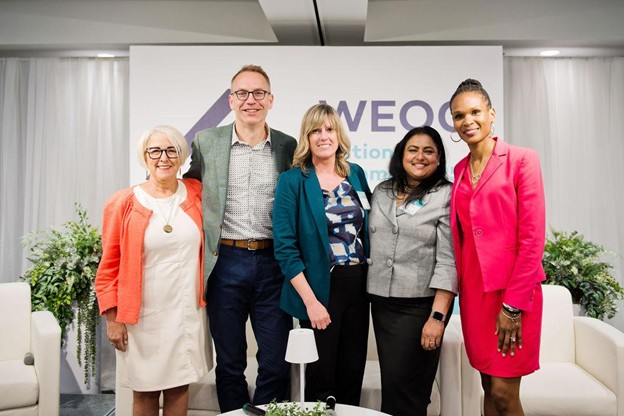Unlocking Inclusive Supply Chains: Key Takeaways from the Supplier Diversity Panel at the WEOC National Summit 2025

On May 8, ecosystem leaders, entrepreneurs and changemakers from across the country gathered in Winnipeg for the WEOC National Summit 2025 to advance strategies for a more inclusive and resilient economy. Among the day’s most impactful discussions was the Supplier Diversity Panel, moderated by Sabine Soumare, Executive Director of the Women Entrepreneurship Knowledge Hub (WEKH).
The panel featured Christina Rodrigues (Canadian Aboriginal and Minority Supplier Council), Danielle Barkman (Women Business Enterprises Canada Council), Darrell Schuurman (Canada’s 2SLGBTQI+ Chamber of Commerce), and Ruth Vachon (Réseau des Femmes d’Affaires du Québec). Together, they explored how supplier diversity— the practice of intentionally sourcing goods and services from businesses led by women, Indigenous Peoples, racialized individuals, 2SLGBTQ+ entrepreneurs, and other equity-deserving groups— is more than just an equity measure, but a business strategy that drives innovation and strengthens supply chains.
Despite growing momentum, the panellists emphasized that systemic barriers continue to limit the full participation of diverse suppliers. Christina Rodrigues noted that Request for Proposal (RFP) processes are often overly complex and resource-heavy, posing significant challenges for small and women-owned businesses to navigate. She also highlighted delayed payment terms as a major obstacle to the financial sustainability of these suppliers.
Danielle Barkman cited findings from a recent report by the Women Business Enterprises Canada Council (WBE Canada), which identified key barriers faced by women entrepreneurs. These include limited resources, stiff competition from larger firms, gender-based stereotypes, limited access to capital, perceived risk aversion and a shortage of women mentors to guide them through corporate supply chains.
Darrell Schuurman added that many 2SLGBTQ+ entrepreneurs choose not to self-identify due to concerns about discrimination, further reducing their visibility in procurement processes despite available programs.
Looking ahead, Ruth Vachon shared how Réseau des Femmes d’Affaires du Québec (RFAQ) is taking a proactive approach through the Maïa Inclusive Growth Project, launched in March 2024 with $3.7 million in federal funding through the Women Entrepreneurship Strategy Ecosystem Fund. The project aims to educate corporations about the business benefits of supplier diversity while providing training and support to women entrepreneurs seeking to enter supply chains. This work directly addresses gaps identified in the 2025 State of Women’s Entrepreneurship in Canada (SOWE) executive summary, which reveals that despite contributing over $90 billion in economic activity and generating over 865,000 jobs, women entrepreneurs remain under-represented in procurement opportunities across Canada.
The panel also addressed the broader market shifts, including the troubling rollback of supplier diversity programs by some U.S. corporations. While acknowledging the risks, Ruth Vachon framed this as a call to action— an opportunity for Canadian organizations to lead by example and champion inclusive supply chain development.
As the session closed, Soumare reminded participants that real, lasting change requires collaboration across government, industry and the entrepreneurial ecosystem. She underscored that supplier diversity is not a passing trend, but a critical pathway to building a stronger, more inclusive and resilient economy for all Canadians.
